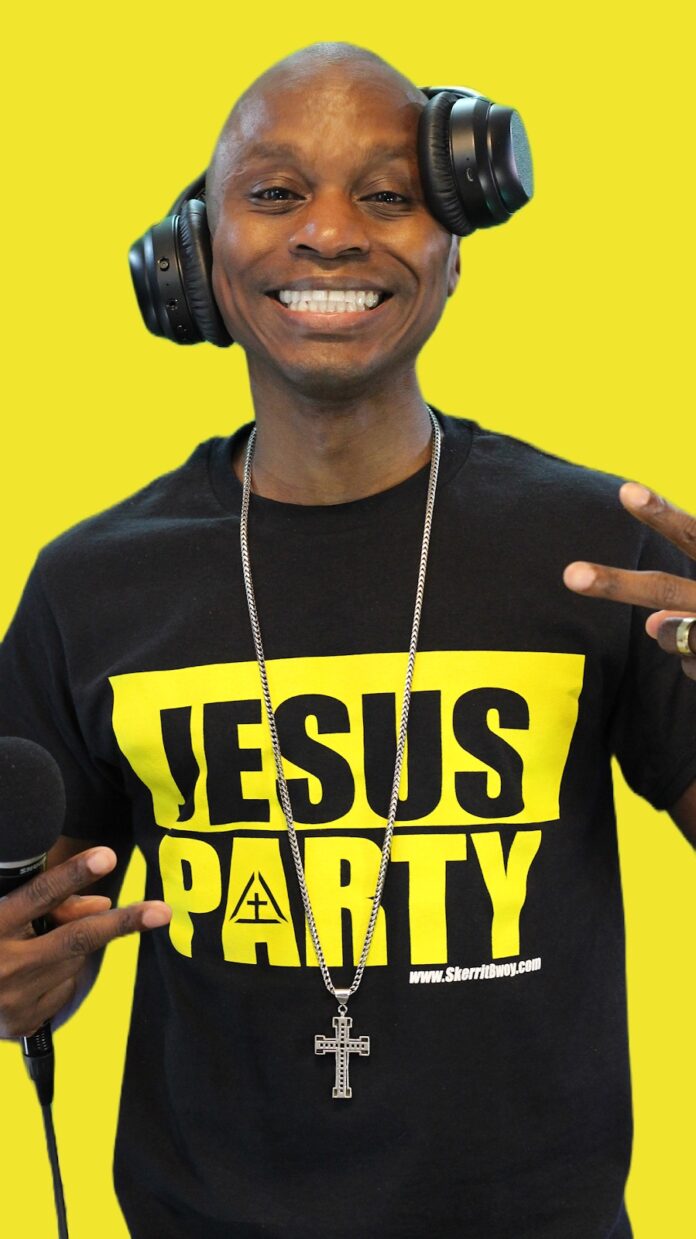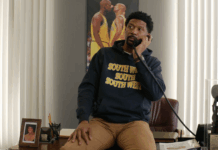( ENSPIRE Entertainment ) Skerrit Bwoy Video for “Jesus Party,” After Past Album Release
Recording artist, Skerrit Bwoy, has released his first music video for his well-received debut album, “Jesus Party Volume 1,” and his second volume to the “Jesus Party” trilogy. Before going solo, Skerrit Bwoy was a former member of the EDM group Major Lazer and now has gone solo to become a creator of Electric Gospel and Christian EDM.
His passion and primary focus through his music is to bring his listeners on a journey with his dancehall-reggae that he combines with the Christian soul. Skerrit Bwoy is building his fan base and being an active member of philanthropy by being an energetic performer, deejay, producer, and songwriter.
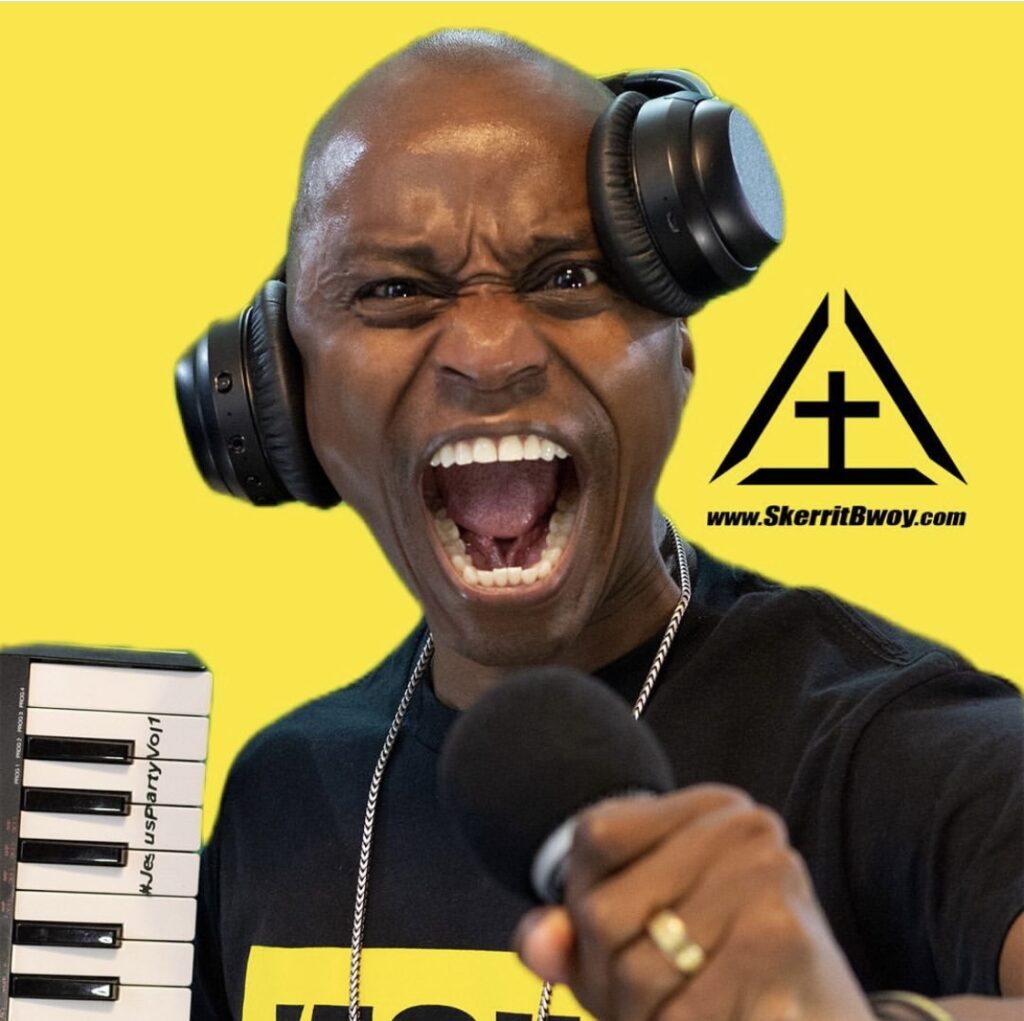
Born in Antigua, Skerrit Bwoy then immigrated to the Bronx, New York, at nine years old with his grandmother. His family has consistently been producing music, so when he saw that both his father and uncle were successful local deejays, he started to create his mixtapes in junior high school. Skerrit Bwoy’s creativity within his music has led him to become known across the world. He has performed in 50 countries and featured on media outlets such as CNN, Large Up, and The Fader. He also was the subject of the documentary “Temporary Sanity,’ by Dan Bruun.
Before eventually becoming a solo act, Skerrit Bwoy enjoyed his time performing with Major Lazer, which included the producers Diplo, Switch, and Jillionaire. Even though he was happy with this success, he wanted his music to focus more on the teachings of Jesus Christ.
Now, “Jesus Party” displays Skerrit Bwoy’s creativity within the industry. The video for “Jesus Party” was directed by Lu Simmo at the Tsaba Studio in Fort Lauderdale, Florida. The video featured many Pop music figures such as Sone G, ZekeDon, Sheni, Foody Boo, Wishbone, and many more.
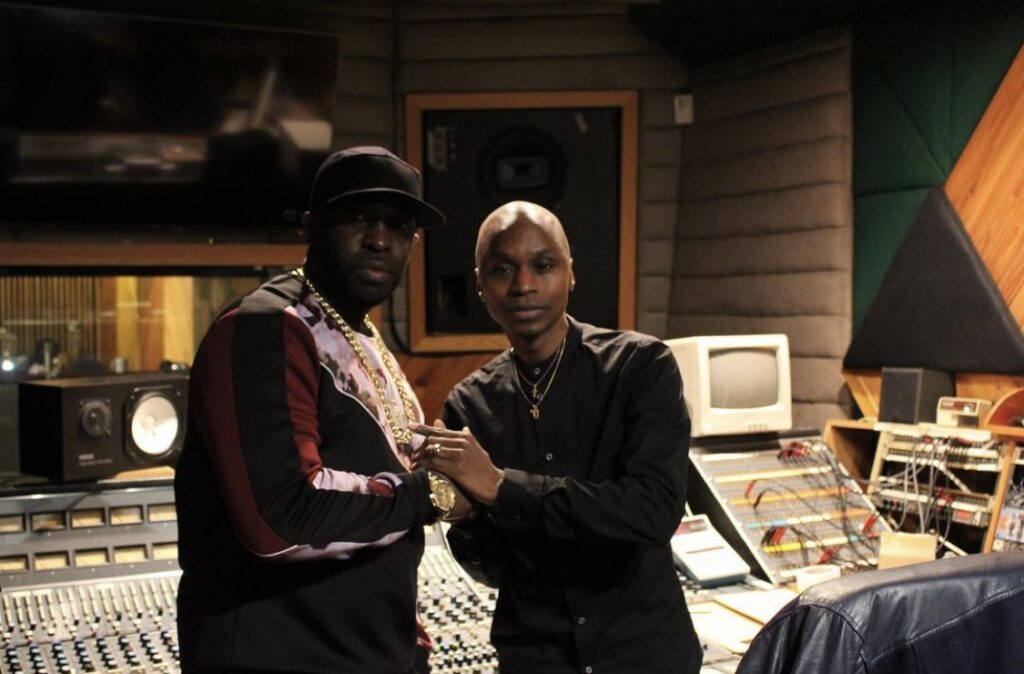
Since his debut release, Skerrit Bwoy has received tremendous attention from his social media platforms. He has booked for seven live events and recently performed at the “Memorial Gospel Fest,” presented by the Caribbean HD Radio. At this event, there were 1000 people and 11,000 people viewing virtually. Skerrit Bwoy is set to perform for 5,000 kids at the Life Conference in Orlando, Florida.
ENSPIRE spoke with Skerrit Bwoy to learn more about his music career and his passion for music:
How was working with MajorLazer?
Can you picture a kid from a village called Mud as a professional musician, touring five days a week, doing stages with about 10,000 – 50,000 people, & getting paid to do anything that he felt like doing?.. It was honestly pretty awesome if you excluded the sin that came along with it. I would probably still be there if I didn’t hear the gospel of Jesus Christ. I’ll be honest, being a Christian in the music business is way more difficult, but it’s way more fulfilling knowing that I’m using my talent to introduce people to discover God’s purpose for their life. There is nothing in this world that I can imagine exchanging for my relationship with our Heavenly Father. Big up, Jesus!
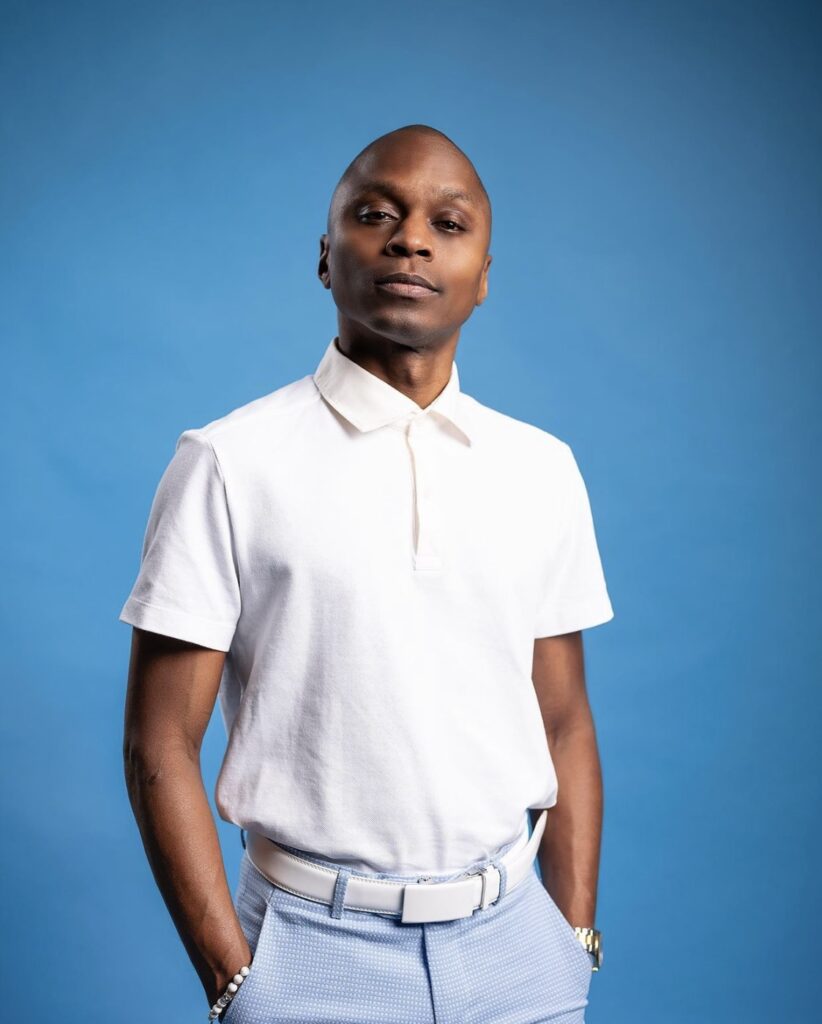
What was your primary role within the group?
My primary role was the MC. That touched various aspects of the team, but Diplo was good behind the turntables, So I made sure the stage show was tight. I had a great stage show reputation before Major Lazer, but Major Lazer gave me access to more resources to execute a bigger vision. I wanted to be sure the stage show was worth people’s time and not just a guy/gal on turntables throwing up hearts and hand signals. So curating the live set was always my favorite thing to do. At times it was working with Diplo to put together a loose set list of music. Other times, it was in the studio going, “Nah,” “that ain’t going to work on stage,” or “Yeah.” That would mashup up the whole festival.” Other times it’s going, “You know, If we brought some Chinese Lion Dancers on stage, people would lose it tonight.” So, just coming up with whatever to be sure that our 60-90 minutes were better than a night out at the movies. I’m a big team player, so I always took the ideas to the group. I know it was good when Diplo goes, “How would we pull that off.” Mimi goes, “What! You’re crazy, but I’m down.” Chris Paules (our tour manager) goes, “How much would that cost?….” They were mad cool and were usually down to experiment. Honestly, there were only two times that I can remember them telling me Nah, but it wasn’t their fault. (1) I wanted a horse to ride out on stage for our 2nd time at Coachella, and something about an animal handler prevented that. (2) I wanted to get shot out of a cannon at Madison Square Garden and something about me possibly falling to my death prevented that.
How do you get inspiration for your songs, and what is your method for producing them?
Don’t laugh, yo! I know this is going to sound extremely Christian, but my music is inspired by prayer. I once read a Bible verse that said, “Pray without ceasing” (1 Thessalonians 5:17), so I just took that up super seriously, especially when I have something “heavy” like music to do. I can’t even picture myself making a track without praying. The Holy Spirit is always the main songwriter. I just get the opportunity to jot things down. As for the production method, I use Ableton Live as my main DAW (digital audio workstation). I plug a bunch of VSTs (other Synths, Drum Machines, and effects) into it, but Ableton Live is the hub of the operation. I do all my programming from there. I usually start with sound design, though. I always want to create at least one weird sound from scratch that no one has ever heard before. At times I may use preset or samples from a pack, but I design like 90% of my own sounds for the Jesus Party albums. Even if I do use a preset or sample, I still give it the work-over with various VSTs (Virtual Studio Technology) to make things sound a bit more like “ear candy.” Once I’m done composing, recording, arranging, and doing the creative mixing, I usually send major releases to another studio to get a second ear and complete the mixing and mastering. By that time, I’m too sentimental and close to the track to find any imperfections. So a second pair of ears keeps me commercially balanced. The remix stuff, I do 100% in-house, though.
When you were younger, what software did you use to create these songs, and how is it different from now?
I learned how to produce music professionally as an adult. So, I have always used Ableton as my main (DAW). Sometimes, I’ll use logic to do some intense mixing if I really want to squeeze a track to the next level of audio madness, like in dubstep. A long time ago, I did do some commercials and voiceover stuff. For that, I used “Garage Band.” Also, if I needed to clean up some fuzz from a dubplate or make a remix, I would use Audacity. I also worked on some deep underground secret “stuff” back in the Bronx before I blew up, and that was primarily pro-tools. I wasn’t hands-on producing at that time either. I was just the idea guy and was just really doing it for fun.
How have your father and uncle helped your success in this industry?\
In every way! I could not be where I am today without a bunch of people supporting me. My uncle Lester was actually the one who introduced me to a variety of music. Most people I know only listen to one or two genres of music but not my uncle. That man listened to absolutely every genre. He also taught me the importance of purchasing music from astray that I like. My dad is the most important person in my life ever! He was the first adult to financially support my vision & even made room for me to step up during his gigs and turn up. He, my uncle Lester (and a few other friends), Brinks, Tiger Bone, and Emmo would buy the sound dubplates, help carry equipment, and make sure that things ram right. Before I was old enough to rent clubs, my dad would go with me & pose as the promoter. Eventually, club owners caught on & were like, “You know, we know it’s your party, you don’t have to bring ya dad with you.” lol. I love my dad, yo. There were also other kids that were super instrumental in even preparing me for the level where my dad chimed in. This is probably the first time I’m sharing this in an interview, but before Major Lazer & even before Ghetto Life Entertainment, I had a sound with some neighborhood friends called “Dem Likkle Bwoys.” Roughly translated, it means “Those Little Boys.” It was Kuma, Zima, Robert, Robin, Kemba, myself. Honestly, yo, that was the absolute most fun time of my pre-Christian DJ career. We were just a bunch of little kids that loved music & found a bunch of other little kids that loved music. We would rent out empty apartment buildings from various supers or adults between 184th to 180th, between Grand concourse & Jerome Ave. Our main base was 183rd & Creston Ave., though. At that time, we weren’t worried about anything except having a good time & getting the neighborhood to have a good time. It was mostly teenagers, but adults would be there too, making sure we were good. So if you talk about success, I gotta give a ton of credit to “Dem Likkle Bwoys.”
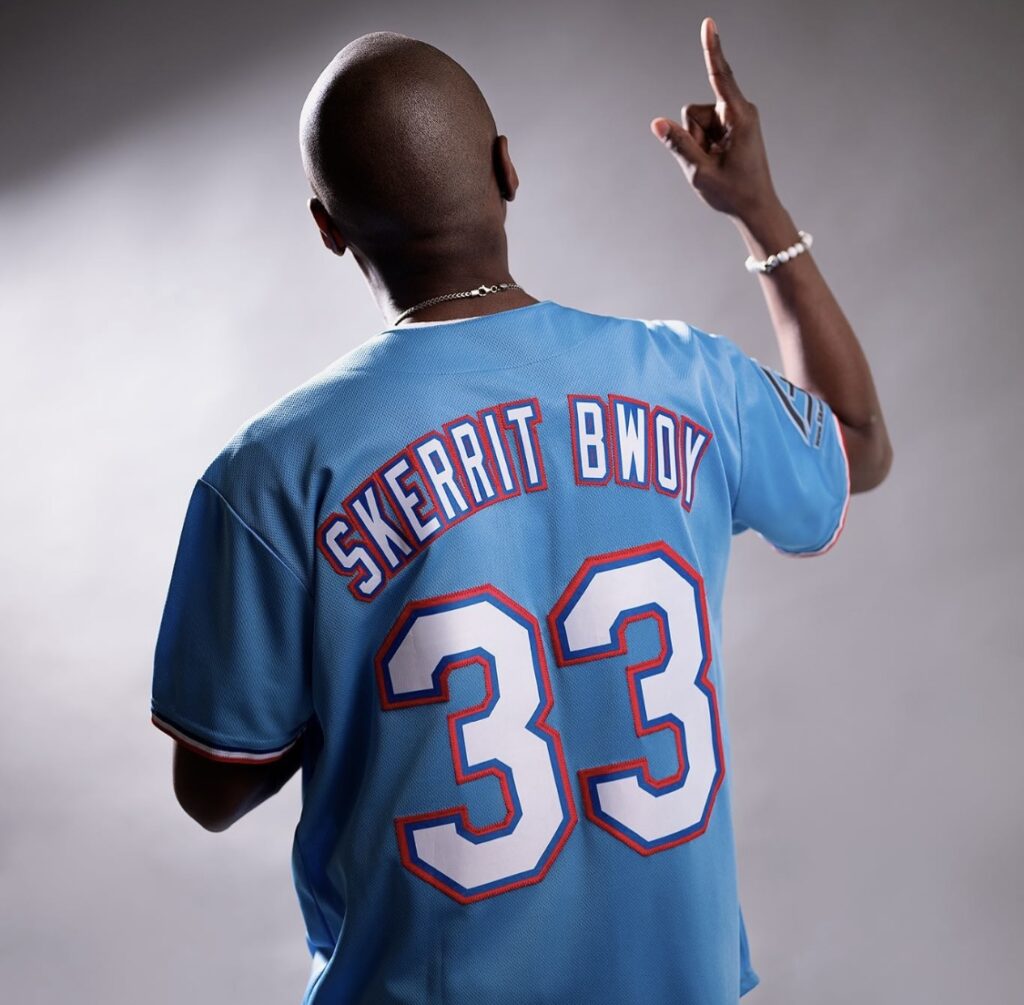
What religious themes are present within the “Jesus Party”?
Overarching: Everything I make points directly to Jesus Christ as my personal God and Savior. My music is 100% Jesus Music & I can’t even imagine another way to create music anymore. Some people believe that it’s limiting, but it’s actually quite liberating. I’ve found my purpose in life & it’s like I’m living a dream come true.
On Vol. 1 – Stomp on the Devil primarily comes from a line in the Bible that goes, “And the God of peace shall bruise Satan under your feet shortly. The grace of our Lord Jesus Christ be with you. Amen” (Romans 16:20 KJV). Fight the Good Fight comes from a Bible verse: “Fight the good fight of faith, lay hold on eternal life, whereunto thou art also called, and hast professed a good profession before many witnesses” (1 Timothy 6:12).
On Vol. 2 – Roll Wid Jehovah is actually the first song that I ever wrote. It’s actually a plea for help from God cause when I first got saved, I didn’t know how I was going to make it because everything I knew as “normal” (social circles, money, profanity, etc.) since my teenage years were now gone. I needed God to show up immediately, and He definitely did. Now, that’s not saying that He will present himself to you in the same way, but trust God (not people) & you will not be disappointed.

What do you want your listeners to take away after listening to your music?
I have one “not-yet-Christian” friend that said, “I already know what the message is. I reject it, but the songs are hot. That’s why I mess with you.” I can live with that because I’ve heard something similar for secular music for years: “I know the words are trash, but the beat is how. So I just dance to the beat.” lol. Hopefully, this style of music will make its way into the mainstream because people think it’s hot. Then eventually, people will listen to the words & begin applying the word. To be honest, even not the majority of the press and listeners are not Christians yet. That’s perfect for me because that means I’m making a positive contribution to the life of the people that have helped me to pass 100,000 streams on Spotify. Yeah, I make the beat hot cause I don’t want people to have an excuse why they don’t listen. However, I really want people to listen to the words. My team is actually working on lyric videos now. We already have sheet music on .pdf & video to distribute too. So, maybe I can hit you with those as a giveaway to your audience or something.
Not only is Skerrit Bwoy with the innovative music he produces, but he is moving people with the religious message he is getting across to his listeners. He has dedicated his life to educating people about God and pursuing his passion for this through music. He wants to convey the message of freedom that one can discover through following God. Not only is he gaining respect from his peers, but more importantly, he is gaining appreciation from his fans for his new twist on dance music.
Check out the music video for “Jesus Party” below. Also, follow Skerrit Bwoy on Instagram @

